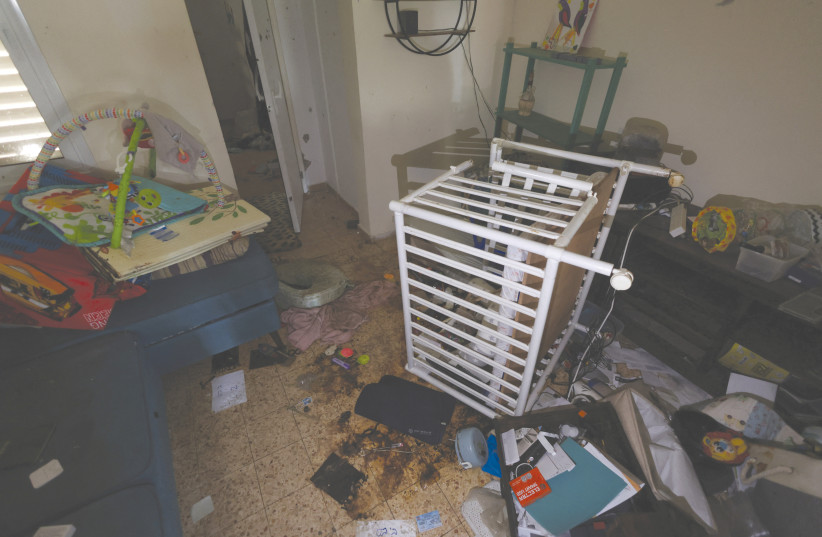Yoav Shimoni, 24, is picking up the pieces of his torn-up family. And he’s doing it from the other side of the world, in Toronto where he lives. His 74-year-old grandmother, Bracha Levinson, was filmed being ruthlessly murdered by Hamas terrorists on October 7. The Jerusalem Post followed up with him to find out how his family is coping today.
Shimoni learned of his grandmother’s brutal killing through a raw video posted on her own Facebook account. Levinson’s murderers used her own cellphone to upload the footage showing her dead on the floor, surrounded by Hamas terrorists.
After not hearing from her grandmother, his sister noticed that she had uncharacteristically posted on the social media app. As soon as she saw the notification, she clicked on it and saw the worst.
When asked how his family is doing some two months later and whether his parents are doing anything new or different, Shimoni responded by saying that his family has gotten a new puppy.
“It’s for my brother for companionship, responsibility, and distraction. We all started doing therapy in some way. Honestly, both my parents and I keep ourselves busy to keep distracted,” the young man explained. His 14-year-old brother saw the clip as well.

“If a person is able to come up to an old lady in her home, shoot her point blank, and record it, there is no humanity in that person,” Shimoni said of the Hamas terrorists.
He has lived around the world and, despite being Israeli-born, spent his teenage years in Shanghai, where his father opened Israel’s first Bank Leumi branch, which closed during Covid.
Levinson had been living on her own in Kibbutz Nir Oz, just a half kilometer from Gaza. About a third of the some 240 hostages taken on October 7 hail from the kibbutz – a fifth of the community – with a quarter of its 400 residents having been murdered. His mother knew many of the victims.
Shimoni emphasized that, while his grandmother is gone, his mother is also dealing with the fact that her childhood home was burned to the ground.
Fears around antisemitism in Toronto
While he is suffering in his heart over the loss of their beloved grandmother, he says that living with antisemitic fears in Toronto has become a new discomfort.
“A month and a bit after October 7 is when we got the identification of her remains, which took so long because there were so little of them,” Shimoni explained.
When he returned from paying respects to his grandmother in Israel, he also returned to a much more antisemitic environment in Canada than he had left.
“Hearing from my Jewish friends in Toronto, I changed my name on Uber and in all the delivery apps,” Shimoni said. “I don’t want to become a target.”
When IDF soldiers retook control of the kibbutz, they recovered letters, a watch, and a ring belonging to the family patriarch, Shimoni’s great grandfather, who was a Holocaust survivor.
Levinson was born in West Germany in 1948. Originally from Poland, her family fled to Russia for protection from the Nazis and moved to Germany after the war. In the 1950s, they left Europe and started a new life in Israel.
“I never talked to her about the Holocaust, but my grandmother was a resilient person. And that is why she loved the kibbutz, despite the dangers – the missiles or tunnels, or any conflict where missiles were flying,” her grandson recalled. We couldn’t even get her to stay in Tel Aviv.”
Levinson was obsessed with the news, always discussing current affairs with her family. She was a private person and Shimoni was warmed to learn that his grandmother had once visited Toronto, the city he now calls home.
“One of my regrets or disappointments is that I wasn’t able to share my life with my grandmother the way I wanted to,” her grandson said.
He is aware that before October 7, Jews were already the biggest victims of hate crimes in Toronto, with years of data to prove it. He says the war is now just giving people more of a reason to hate.
“Because of the war and the reception internationally and especially in Canada and Toronto, it actually made me feel less safe here than I did three weeks ago in Israel, when we had three missile alerts per day,” Shimoni said. “There’s been way too many attacks and hate crimes against Jews.”
As his family strives to move forward, he expressed hope for an end to the war, yearning to return to Israel without the specter of conflict and with the hostages back home.
In the face of unspeakable tragedy, Yoav Shimoni and his family are resiliently healing through love and distractions – and a puppy.
